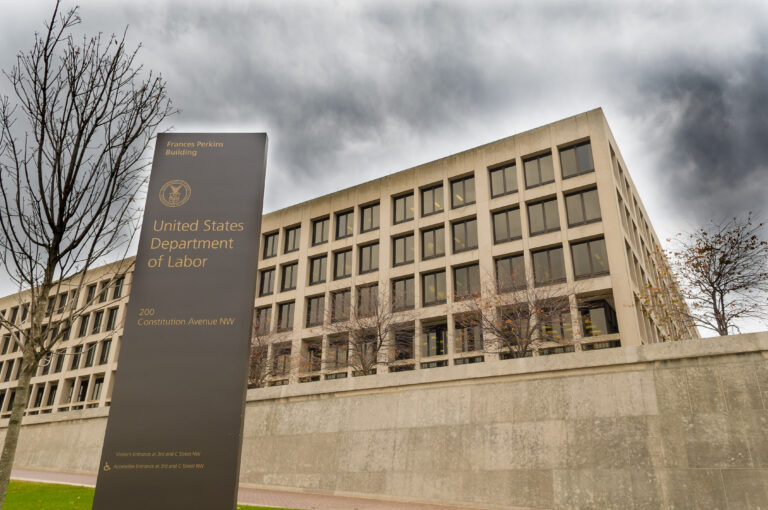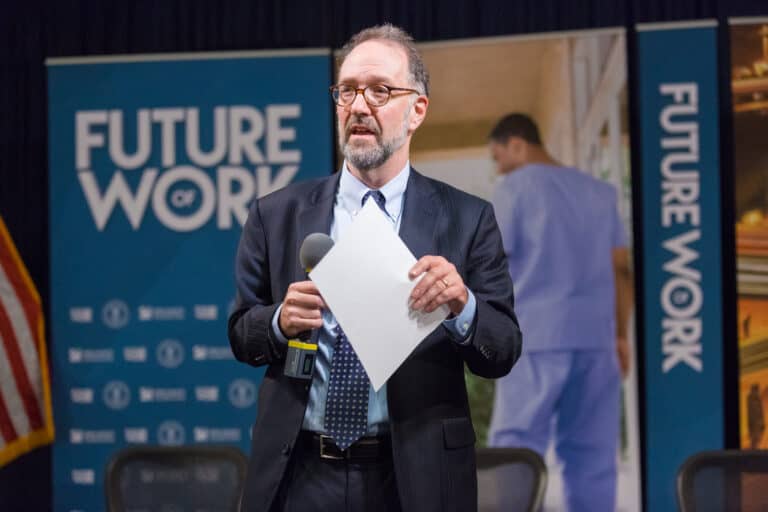On October 3 the Supreme Court will hear oral argument in New Prime Inc. v. Oliveira, the first arbitration case before the justices since they decided Epic Systems in May. Today we recap the briefs submitted this summer by petitioner New Prime Inc. and respondent Dominic Oliveira. Tomorrow we will summarize the briefs submitted by amici curiae for New Prime, and next week we will summarize those submitted for Oliveira.
We previously outlined the case’s facts and procedural history after the Court granted cert. In short, Dominic Oliveira signed an agreement to work as an independent contractor for New Prime, an interstate trucking company. The contract contained provisions agreeing to submit disputes under the contract, including disputes over arbitrability, to individual arbitration. Oliveira claims he was an employee misclassified as a contractor and brought a class action lawsuit alleging that New Prime violated the Fair Labor Standards Act, which establishes wage-and-hour and overtime protections for employees. New Prime filed a motion to compel arbitration under the Federal Arbitration Act (“FAA” or “the Act”), which says written arbitration agreements in commercial contracts are generally valid and enforceable.
Oliveira opposed the motion. First, he argued that where a contract contains an agreement to arbitrate disputes, including those about arbitrability, the FAA does not require a court to compel arbitration of the question whether the FAA applies. Second, he asserted that Section 1 of the FAA, which exempts “contracts of employment of seamen, railroad employees, or any other class of workers engaged in foreign or interstate commerce” from the Act, applies to independent contractor agreements in the transportation industry. The Court is expected to decide the validity of those two claims.
On the first issue, New Prime argues that where a contract contains an agreement to resolve disputes over arbitrability through arbitration, that bargained-for agreement must be enforced the same as a contract’s arbitration provisions for substantive disputes. Deciding otherwise would violate the parties’ freedom of contract and run contrary to the Supreme Court’s previously articulated view of the FAA as a liberal federal policy favoring arbitration.
On the second issue, New Prime asserts that the text, historical context, and purpose of the FAA all point to a restrictive interpretation of “contracts of employment” that excludes independent contractor agreements from the Section 1 exemption. “Contracts of employment” plainly refers to agreements between employers and employees, not independent contractors. Congress comprehended the longstanding distinction between common-law employment and independent contractor relationships when it passed the FAA, having enacted other statutes at the time that distinguished “employees” from independent contractors. Congress also intended the Section 1 exemption to be narrow, and a broader reading would frustrate the FAA’s purpose of making arbitration widely accessible.
New Prime further contends that the applicability of the Section 1 exemption requires no inquiry into the relationship between the company and the worker beyond the four corners of the contract. If a worker signs an agreement establishing an independent contractor relationship with a company, the agreement falls outside of the Section 1 exemption no matter if the actual work resembles employment. Even so, New Prime claims, Oliveira was properly classified as an independent contractor. Oliveira entered into the contract as the proprietor of his own limited liability company and could choose the method and manner of his work, hire others to work for him, and perform work for other trucking companies.
On the first issue, Oliveira argues that a court must determine whether the FAA governs the agreement prior to using it to compel arbitration. Courts cannot rely on laws that do not apply.
On the second issue, Oliveira argues that the FAA’s Section 1 exemption for “contracts of employment” in the transportation industry extends to independent contractor arrangements. When Congress passed the FAA in 1925, “contracts of employment” referred generally to agreements to perform work, not just contracts establishing a common-law employment relationship. New Prime cites contemporaneous statutes that distinguished “employees” from independent contractors, but just because “employees” had multiple definitions in 1925 does not change the fact that “contracts of employment” had one. Dictionaries at the time defined “employment” broadly as work. Moreover, courts across the country, including the Supreme Court itself, routinely characterized the work agreements of independent contractors as “contracts of employment.”
Congress also enacted the Section 1 exemption to preserve established statutory dispute resolution mechanisms for all transportation workers. The 1872 Shipping Commissioners Act and the 1920 Transportation Act, for instance, were invoked to resolve disputes involving both employees and independent contractors. The goal of these statutes was to ensure the smooth operation of the transportation industry for the general public, which was only possible if anyone performing work in the industry could resolve their disputes efficiently. By contrast, workers’ compensation schemes, like the statutes cited by New Prime and amici curiae on its side, could be limited to common-law employment relationships because the compensation of injured contractors was of little relevance to the public.
Oliveira further contends that the applicability of the Section 1 exemption requires an inquiry into the actual relationship between the company and the worker beyond the four corners of the contract. Otherwise, employers could circumvent the exemption simply by mislabeling their employees as independent contractors. In this case, many aspects of Oliveira’s contract with New Prime resembled a common-law employment relationship. New Prime could fire Oliveira without cause, Oliveira’s work was part of New Prime’s regular business, and Oliveira’s work for New Prime evidenced a continuing relationship with the company.










Daily News & Commentary
Start your day with our roundup of the latest labor developments. See all
March 4
the NLRB and Ex-Cell-O; top aides to Labor Secretary resign; Attacks on the Federal Mediation and Conciliation Service
March 3
In today’s news and commentary, Texas dismantles their contracting program for minorities, NextEra settles an ERISA lawsuit, and Chipotle beats an age discrimination suit. Texas Acting Comptroller Kelly Hancock is being sued in state court for allegedly unlawfully dismantling the Historically Underutilized Business (HUB) program, a 1990s initiative signed by former Governor George W. Bush […]
March 2
Block lays off over 4,000 workers; H-1B fee data is revealed.
March 1
The NLRB officially rescinds the Biden-era standard for determining joint-employer status; the DOL proposes a rule that would rescind the Biden-era standard for determining independent contractor status; and Walmart pays $100 million for deceiving delivery drivers regarding wages and tips.
February 27
The Ninth Circuit allows Trump to dismantle certain government unions based on national security concerns; and the DOL set to focus enforcement on firms with “outsized market power.”
February 26
Workplace AI regulations proposed in Michigan; en banc D.C. Circuit hears oral argument in CFPB case; white police officers sue Philadelphia over DEI policy.